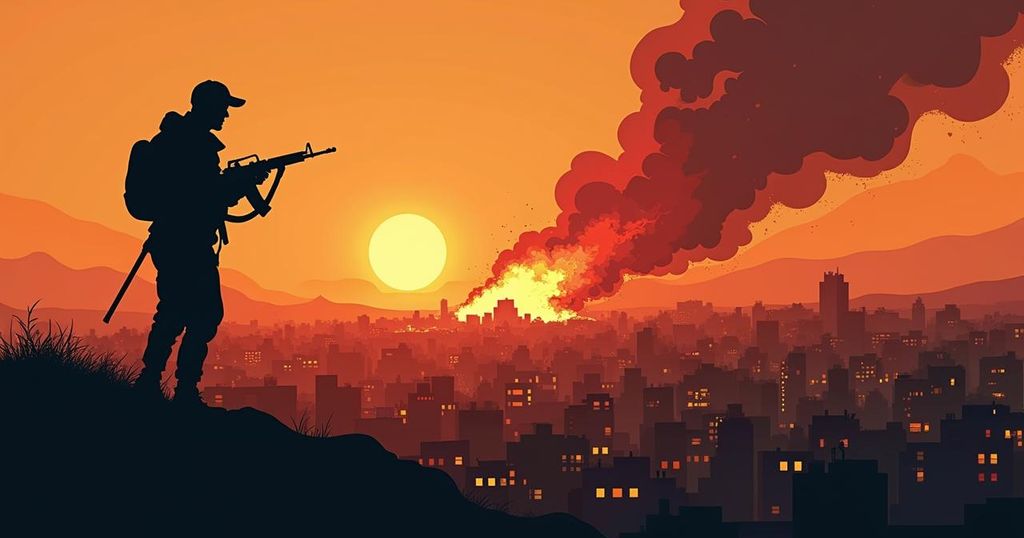Escalation of Conflict: Israel and Hezbollah in The Wake of the Gaza War

Israel’s military confrontations with both Hamas in the Gaza Strip and Hezbollah in Lebanon have intensified as the conflict enters its second year following the devastating attacks on October 7, 2023. The situation has led to significant humanitarian crises, while the United States continues to support Israel amid ongoing tensions in the region.
As the conflict between Israel and Gaza enters its second year, hostilities have intensified on multiple fronts. Recent carriages of violence included cross-border strikes between Israeli forces and Hezbollah, a Lebanese militant group, following the anniversary of the October 7, 2023, Hamas assault which catalyzed Israel’s military operations in Gaza. Media reports indicated that Hezbollah launched attacks targeting Israeli settlements and military installations, while Israel retaliated by striking more than 70 Hezbollah positions, including significant sites within Beirut. The severity of the Israel-Gaza war, which commenced on October 7, 2023, following a devastating cross-border attack by Hamas resulting in approximately 1,200 Israeli fatalities and numerous civilian hostages, has spurred one of the most catastrophic humanitarian crises in recent history. In response to the attacks, Israel declared war on Hamas, which has led to a significant military presence and ground invasion in Gaza, resulting in widespread displacement and destruction since 1948. Notably, the death of prominent Hamas leader Ismail Haniyeh in July 2024 due to an alleged Israeli offensive has further fueled tensions. Moreover, the aggressive actions of Hezbollah in recent months have traced a trajectory of escalating conflict between the organization and Israeli forces, backed by Iran. The situation has led Israel to conduct extensive airstrikes across Lebanon, resulting in significant casualties, including the deaths of both combatants and civilians. The complex history of violence between Israel and Hezbollah, rooted in the tumultuous events surrounding Israel’s establishment, continues to exacerbate regional instability. Within the Gaza Strip, the humanitarian situation has reached dire straits, with a substantial portion of the population experiencing famine-like conditions amid ongoing military engagements. Despite persistent calls for humanitarian assistance from Western allies, Israel has maintained stringent controls over aid to the territory. United States involvement remains a critical factor, as it continues to provide military support to Israel, despite some friction between the Biden administration and the Israeli leadership. The U.S. has also played a pivotal role in international arenas, such as the United Nations, where it has exercised its veto power on resolutions calling for cease-fires, emphasizing its commitment to supporting Israel’s military objectives. The historical complexities underpinning the Israeli-Palestinian conflict are extensive, with underlying resentments dating back to well before the establishment of Israel in 1948, demonstrating the multi-faceted nature of this ongoing crisis.
Understanding the intricacies of the Israel-Gaza war requires a historical perspective on the Israeli-Palestinian conflict, marked by decades of struggles for sovereignty, territorial disputes, and deep-seated mistrust. The war has escalated dramatically following a major assault by Hamas on October 7, 2023, prompting retaliatory military operations by Israel, which have triggered widespread violence across neighboring regions, particularly Lebanon, involving Hezbollah. This persistent conflict continues to evolve, affecting millions in the region and invoking international interest and support for various parties involved.
In summary, the Israel-Gaza war has escalated into a protracted conflict affecting not only Israel and Palestine but also drawing Lebanon and Hezbollah into the fray. With rising casualties and exacerbated humanitarian conditions, the region stands at a critical juncture, requiring urgent international attention and intervention to mitigate the humanitarian crisis while addressing the underlying historical grievances that have fueled this enduring conflict.
Original Source: www.washingtonpost.com








